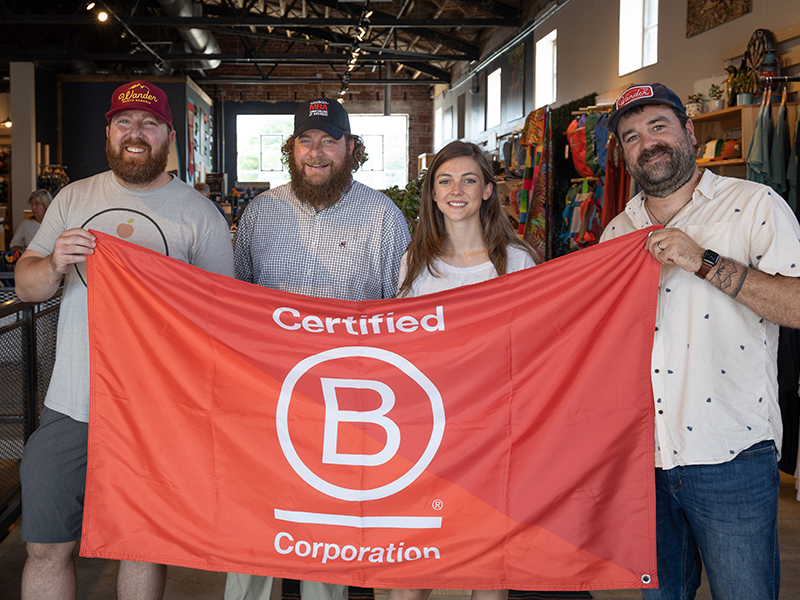What’s good for business and what’s good for society used to be a choice between two paths that didn’t necessarily intersect, separated by the profit motive.
More business owners and shareholders are rejecting that idea, and Terry College of Business students are learning that being socially good can be great for business.
Over the past two years, Terry MBA students pursuing the full-time program’s Social Innovation area of focus have helped more than a dozen businesses improve their operations to make a bigger difference in their communities and a more sustainable impact on the environment.
In the for-profit arena, the gold standard for companies that measure their success in environmental, social and governance metrics, or ESG for short, is B Corp certification. The certification involves a data-driven audit of the company’s impact on its workers, the community and the environment that is overseen and awarded by the B Lab nonprofit.
Keeping score to stay on track
“The process gives businesses a scorecard, a way to talk about these things that’s tangible,” said Josh Brown, co-owner of Wander North Georgia, an independent outdoors outfitter and lifestyle store in Clayton, Georgia. “It lets me see that if I’m not quite where I’m supposed to be here, then there’s a way to improve that. It’s not just a score on paper, but it flows into every part of the life of our business.”
Wander North Georgia is one of the latest small companies to complete the B Corp audit process and apply for certification with the help of a team of UGA students. Other companies partnering with UGA have included a brewery, a wealth management firm, a software company and an architectural firm.
Emylee Connally, a 2021 MBA graduate, led a team of fellow Terry students and UGA undergrads working toward their Certificates in Sustainability to consult with Wander North Georgia in spring 2021.
“We were looking to help them highlight that they were a sustainable company and that they were partnering with their community,” Connally said. “They were already doing well, a really forward-thinking company. We worked with them to find ways to make their business more environmentally friendly.”
Much like the Department of Agriculture’s certification process for organic farms or the LEED certification for sustainably-built buildings, the process for B Corp certification involves gathering and analyzing reams of business data: from hiring and salary records to vendor diversity profiles and energy use.
It takes months of work that business owners don’t always have time to give. Consultants are available, but affording their services is difficult for smaller companies.
“We started the B Corp process before, and I just got overwhelmed with the data and knowing what next steps to take,” Brown said. “The students got the ball rolling, and the momentum going. There was no way we could do this without them.”
Students bring enthusiasm, new perspective
Nathan Stuck, a 2017 Terry MBA graduate who has taught courses on B Corp certification in Terry’s Full-Time MBA Program, started consulting with companies who wanted to become B Corp certified, including Bulldog 100 honoree Ad Victoriam Solutions, during his time as a UGA graduate student. He co-founded B Local Georgia, a nonprofit that promotes B Lab certification in Georgia, and currently serves as founder and CEO of Profitable Purpose Consulting.
Students, he said, have the enthusiasm and outside perspective needed to help small business owners achieve their goals.
“There’s a lot of stuff that is low-hanging fruit — draft a lactation policy for breastfeeding mothers, create a volunteer time-off program,” Stuck said. “But when it gets to the medium-hanging fruit and the really hard stuff, you have to look at your options and ask, ‘What would this change for us from a time standpoint or money standpoint, and what would we get out of it? Is there a compelling marketing story there, or does it align with our belief system?’”
Students break down those choices for the business owners, offer analysis and do the legwork to find solutions, he said.
At Wander North Georgia, students helped Brown analyze the store’s carbon footprint, the employee handbook and helped the business take some innovative steps toward social equity.
For instance, they developed a blind application system that helped Wander North Georgia remove unconscious bias in its hiring process.
Putting classroom lessons into practice
For MBA students like Connally, the consulting work was a great chance to put her management skills into practice.
“It was a great opportunity to get to lead a team of people with a lot of different skill sets,” Connally said.
For the undergraduates, they saw how sustainability issues they learned about in the classroom played out in the real world.
“It’s different when you’re sitting in the classroom and hearing about all of these different topics, like sustainable business. It’s a whole other thing to go in and do it,” said Jenna Franke, who worked with Connally’s team and two other B Corp certification projects before she graduated with her bachelor’s degree in environmental economics. “Learning how to talk to people and learning how to consult, that’s not something that a classroom setting can teach you.”
This fall, Stuck’s class on B Corp management has a roster of six new clients. Like Connally, many of the students involved with these projects will never work for a B Corp. But they will bring some of the B Corp ways of thinking with them when they enter the workforce, Stuck said.
“We’ve got a new generation of business leaders who not only understand how to make money, how to sell, how to market, but they also know how to look at things from a stakeholder’s perspective,” Stuck said. “They can say, ‘Hey, let’s look at this from a different lens: what’s the impact on our people, the environment, our community?’ These students will be change agents on the inside who will make these businesses better.”

